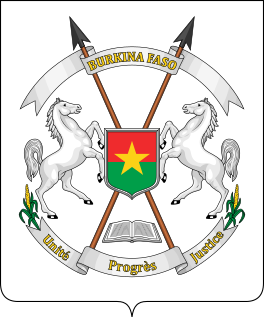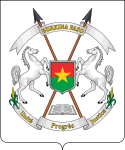
The Politics of Burkina Faso takes place in a framework of a semi-presidential republic, whereby the Prime Minister of Burkina Faso is the head of government, and of a multi-party system. The President of Burkina Faso is the head of state. Executive power is exercised by both the President and the Government. Legislative power is vested in both the government and parliament. The party system was dominated by the Congress for Democracy and Progress (CDP) until the 2014 Burkinabé uprising. Since then, the CDP has lost influence. The Judiciary is independent of the executive and the legislature. The Economist Intelligence Unit rated Burkina Faso as a "hybrid regime" in 2016.

The Convention of Progress Forces was a political alliance in Burkina Faso (former Upper Volta. It was founded in January 1994 by the following political parties:

The Party of Labour of Burkina was a political party in Burkina Faso.
Articles related to Burkina Faso include:
Bognessan Arsène Yé is a Burkinabé politician who was President of the Assembly of People's Deputies of Burkina Faso from 1992 to 1997, President of the Congress for Democracy and Progress (CDP) from 1996 to 1999, and a Minister of State from 1997 to 2000. He was appointed as Minister of State for Relations with Parliament and Political Reform in April 2011.

Parliamentary elections were held in Burkina Faso on 24 May 1992. They were the first parliamentary elections held in the country since 1978, and the first to be held under the 1991 constitution. The result was a victory for the Organization for Popular Democracy – Labour Movement, which won 78 of the 107 seats in the National Assembly.

Sankarism is a term sometimes applied to denote a left-wing ideological trend within the political milieu of Burkina Faso, a landlocked country in West Africa, as well as the policies of the military government led by Captain Thomas Sankara. Sankara came to power in what was then the Republic of Upper Volta in a popularly-supported 1983 military coup, and ruled until his assassination in a coup led by Blaise Compaoré in 1987.
The 1982 Upper Voltan coup d'état took place in the Republic of Upper Volta on 7 November 1982. The coup, led by the little-known Colonel Gabriel Yoryan Somé and a slew of other junior officers within the military, many of them political radicals, overthrew the regime of Colonel Saye Zerbo. Zerbo had previously taken power just under two years prior to his own downfall.

The Movement of Progressive Democrats was a political party in Burkina Faso.

The Union of Social Democrats was a political party in Burkina Faso.

The Rally of Social-Democrat Independents was a political party in Burkina Faso led by Alain Bédouma Yoda.

The Party for Democracy and Rally was a political party in Burkina Faso led by Daouda Bayili.
Zéphirin Diabré is a Burkinabé politician. He served in the Government of Burkina Faso as Minister of Finance during the 1990s. He stood as a candidate in the November 2015 presidential election, placing second behind Roch Marc Christian Kaboré. Zéphirin Diabré is an economist by training and holds a doctorate in management sciences from the Faculty of Economics and Management of Bordeaux, France. He joined the University of Ouagadougou in 1987 as assistant professor of management before joining the private sector between 1989 and 1992 as deputy director of Brakina. He was elected MP in 1992 under the banner of the Organization for Popular Democracy-Labour Movement, but gave up his seat to his deputy to occupy respectively the positions of Minister of Trade, Industry and Mines (1992-1994), ministers of the Economics and Finance (1994-1996), President of the Economic and Social Council (1996-1997). He leaves the Congress for Democracy and Progress for reasons of differences and opts for an international career. Initially a researcher at the American Harvard University, then deputy general manager of United Nations Development Programme (UNDP) of the United Nations and then Africa and Middle East director of the AREVA group, Zéphirin Diabré chose to return to the fold. In May 2009, Zéphirin Diabré already announces the colors of alternation by organizing a forum on the subject in Ouagadougou. On March 1, 2010, he and other comrades created the UPC, an opposition political party that advocates democratic change and "real change" in Burkina Faso.





